
New Managing Director for Bellona Norway
The Board of the Bellona Foundation has appointed former Minister of Climate and the Environment Sveinung Rotevatn as Managing Director of Bellona No...
News

Publish date: February 14, 2014
News
Members of the Environmental Watch on the North Caucasus (EWNC) today met with Norwegian Prime Minister Erna Solberg, who made a trip to Sochi with inquiries about the three-year prison colony sentence handed to group member Yevgeny Vitishko over his prominent ecological activism surrounding the 2014 Winter Olympics.
The meeting, which EWNC’s Vladimir Kimaev said in an email focused on the extreme pressure that Russia has put on environmental activists in the run up to Sochi 2014 –Vladimir Putin’s trophy project to show off “the modern Russia” – preceded a meeting Solberg had with Russian Prime Minister Dmitry Medvedev later in the day.
Alexander Popkov, Vitisko’s lawyer, told Bellona after the EWNC’s meeting with Solberg that it was a “positive sign that the Norwegian Prime Minister took the time to hear about our problems first hand.”
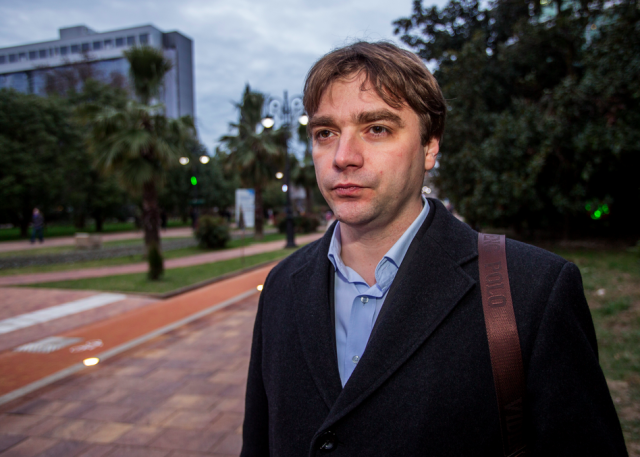
Popkov quoted her as saying that there is relatively little she could do to pressure on the Russian government for Vitishko’s release until Russia itself is willing to engage in an open conversation about human rights. But Popkov added that, “the fact that she will have the chance to raise this question on a level as high as Prime Minister Medvedev is a positive development.
Solberg warns of ‘friction’ over human rights
Following here meeting with Medvedev, Solberg told Norwegian television outlets that the two had “spoken of several high profile cases and specific people that have been in the media,” in reference to Vitishko, and said differing views on human rights could cause “friction” between the two countries.
“I think (Medvedev and his group) saw me as both concrete and direct in this meeting. I also noticed that they didn’t feel it was the most diplomatic thing they had heard,” Solberg said, as quoted by the NTB Norwegian news wire. She also reported that officials in Medvedev’s entourage “do not like to be criticized.”
“I told Medvedev that (Norway and Russia) have cooperation on the state and business levels, but it is also important to have cooperation on the human level,” Solberg said, as broadcast on VG tv (in Norwegian).
She noted that a scheduled joint appearance of her and Medvedev after the talks had been scotched by the Russian Prime Minister, which Solberg chalked up to “his feeling that there was perhaps too much focus on the human rights issue in our discussion.”
Bellona General Director Nils Bøhmer was instrumental in setting up the meeting between Solberg and EWNC representatives, drawing her attention to the government pressure the group was facing after Bellona.org reporters spent time with the environmental group in the Krasnodar Region – where Sochi is located – during the days prior to he Games.
Solberg, Human Rights Watch, call the IOC to account
Solberg herself was quoted by VG, the Norwegian daily, as saying that the International Olympic Committee should be more involved in studying questions of human rights in the countries to which it grants the Olympics.
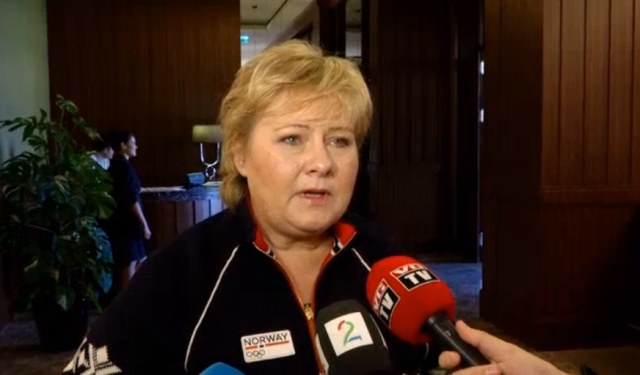
“I think it is important that the IOC ensures that basic human rights be implemented (in countries) where they have the Olympics,” she said.
As for the IOC, Head of Media relations Emmanuelle Moreau told Bellona in an email interview from Geneva that the Olympic headquarters had telephoned Russia’s Sochi 2014 organizing committee for clarifications on the Vitishko case, and determined his imprisonment has nothing to do with the Olympics
“You will understand that, no matter how we feel about issues, we can only act upon concerns directly related to the Games and where there are clear facts linking the Games to the issue in question,” she wrote.
“The information provided by Sochi 2014 throughout the last months indicated that the case of Mr Vitishko was not related to the preparation of the Olympic Games,” she wrote. “The letters we received from different NGOs on this matter did not contain any evidence that this specific case was Games related, either.”
The New York-based Human Rights Watch group, however, called directly on the IOC to push for Vitishko’s freedom in a statement it issued Wednesday.
“The International Olympic Committee should urge Russia’s authorities to free Vitishko,” said Human Rights Watch
“The case against Vitishko has been politically motivated from the start,” said Yulia Gorbunova, Russia researcher at Human Rights Watch.
“When the authorities continued to harass him it became clear they were trying to silence and exact retribution against certain persistent critics of the preparations for the Olympics,” she said.
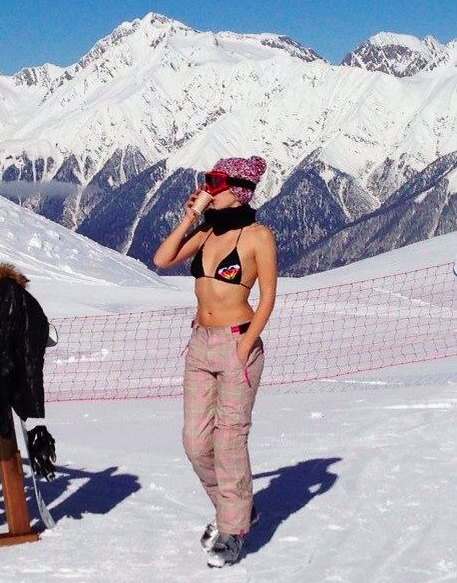
Lawyer Popkov was equally insistent that the IOC should intervene, but expected little from them.
“It’s good that the IOC called Sochi 2014 about Yevgeny’s case, but Russian officials have a well developed habit of ignoring them,” he told Bellona by telephone. “The Russians tell them everything is okay, and the IOC nods its head and says rights abuses have nothing to do with them anyway.”
“Nothing is going to sully their tower in Geneva,” he added. “It’s ridiculous to say that Yevgeny’s imprisonment has nothing to do with the Olympics – he’s been pointing out its ecological flaws for years.”
Mad rush to deliver Olympic environmental report
Since November there have been at least six detentions of EWNC members, some of whom have been jailed for three to 15 days.
At the time Bellona visited Krasnodar, Tuapse and Sochi, EWNC was heavily under the gun – and heavily under surveillance from authorities – as it prepared to release a scathing environmental report on damage done by Olympic construction to Russia’s only subtropical area on the Black Sea.
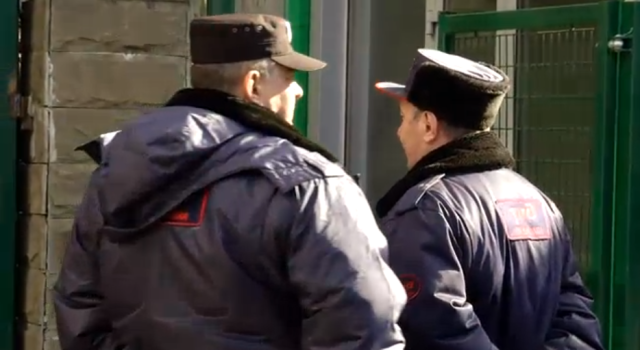
The massive report (available in Russian with an English translation to appear soon) details everything from the extent to which Russian environmental law was doctored at the behest of the Kremlin to allow Olympic construction on the protected lands of Sochi National Park, to destruction of low lying wetlands which have driven out winter migration spots for endangered bird species; to the destruction of the Mzymta River, Sochi’s main drinking supply with construction debris, chemicals and landslides due to excessive deforestation; to vote manipulation by Russian crime bosses of the International Olympic Committee members that chose Sochi over more qualified host cites, to plummeting air quality.
The report was to be released in Sochi on February 6 as the international press corps descended on the Olympic capital. But that was scuttled when Vitishko was arrested on February 3 for allegedly swearing in public and immediately jailed for 15 days in his hometown of Tuapse, 73 kilometers northwest of Sochi, the report’s release was put off.
At the time, Vitishko had already been sentenced to three years on a penal colony on December 21 for spray-painting on an illegal construction fence in Sochi National Park, which surrounded the mansion of Krasnodar Regional Governor Alexander Tkachev, and for two violations of probation.
He has been ordered to serve our the remainder of his cussing sentence, which ends February 18, and will go directly to a penal colony from there.
Vitishko innocent, says anyone close to the case
Vitishko, Popkov, other members of EWNC and Bellona assert that Yevgeny is entirely innocent of all charges against him, from spray-painting on Tkachev’s fence to the public swearing incident.
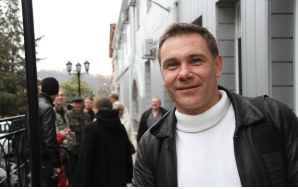
At the time of his February 3 arrest, Vitishko was free under an agreement that he not leave Tuapse without official approval pending an appeal of his prison sentence, which initially scheduled for Feb 22. During that time, he had a wide-ranging interview with Bellona, the last media organization to speak with him before he was jailed.
After his so-called administrative detention on the public swearing charge, however, his appeal in the regional court in Krasnodar, was moved back by authorities to February 12, assuring he would not be able to attend the appellate hearing accept by a crackly television link.
After a two-hour delay in the court proceedings because Tuapse correctional officers were late delivering Vitishko to the Tuapse courtroom tele-link, Krasnodar appellate judge Alexander Konov deliberated for two minutes before upholding Vitishko’s three-year custodial sentence.
In a further Orwellian twist, as confirmed by the prosecutor Wednesday, there are absolutely no records that the construction fence Vitishko is accused of defacing even exists.
EWNC finally succeeded in releasing is report on Moscow on the same day, minutes after Vitishko’s sentence was handed down.
While Popkov applaudes the involvement of Solberg, Human Rights Watch and other European governments to help free his client, his view of the assistance is not so much relief over the cavalry’s arrival so much as it is resignation that international intervention can’t make things any more difficult.
“It can’t get any worse,” he said. “It’s already as bad as it can get.”
According to 1primeru news portal, however, it just might. The agency yesterday ran a story on how it will cost Russia another $7 billion to keep Olympic infrastructure intact over the next three years alone before things start crumbling into landslides or slipping into the sea – exactly as Vitishko predicted while showing Bellona around Tuapse.

The Board of the Bellona Foundation has appointed former Minister of Climate and the Environment Sveinung Rotevatn as Managing Director of Bellona No...

Økokrim, Norway’s authority for investigating and prosecuting economic and environmental crime, has imposed a record fine on Equinor following a comp...

Our op-ed originally appeared in The Moscow Times. For more than three decades, Russia has been burdened with the remains of the Soviet ...

The United Nation’s COP30 global climate negotiations in Belém, Brazil ended this weekend with a watered-down resolution that failed to halt deforest...